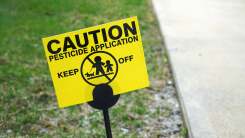Hey there, my friends! Let me tell you something important – if you’re all about using pesticides, then it’s high time you start chatting up your neighbors. Trust me on this one!
The Power of Neighborly Connections
In our vibrant Maasai community, we understand the value of strong bonds with our neighbors. These connections are like a golden thread that weaves us together in harmony and unity. Similarly, when it comes to using pesticides, engaging with your neighbors is crucial for maintaining a healthy environment.
You see, my dear readers, pesticides have the power to affect not only your own patch of land but also those surrounding it. By initiating conversations with your neighbors about pesticide use and its potential impact on their homes and gardens, you can foster understanding and cooperation.
Through open dialogue rooted in respect and empathy, we can collectively find solutions that benefit everyone involved. Sharing knowledge about alternative pest control methods or discussing strategies for minimizing pesticide drift will help create an atmosphere of shared responsibility towards safeguarding our precious ecosystem.
Avoiding Unintended Consequences
Pesticides may be effective at tackling pests initially; however, they often come with unintended consequences that ripple beyond borders. Without proper communication between neighboring households or farms utilizing these chemicals simultaneously or nearby could lead to cross-contamination issues.
We must remember that nature knows no boundaries – what affects one plot of land has the potential to impact others as well. By reaching out to our fellow farmers or gardeners nearby who might be affected by pesticide usage choices made on our own properties, we can prevent unintentional harm from occurring.
Fostering a Greener Future Together
Now, my friends, let’s talk about the bigger picture. By engaging with our neighbors and discussing pesticide use openly, we can collectively work towards a greener future. Together, we have the power to reduce our reliance on harmful chemicals and explore more sustainable alternatives.
Imagine a community where organic farming practices flourish, where beneficial insects thrive alongside crops, and where harmony between humans and nature is celebrated. This vision can become a reality when we come together as neighbors united by a common goal – preserving our environment for generations to come.
In Conclusion
So there you have it! Engaging in conversations with your neighbors about pesticide usage might seem like an extra step or even an inconvenience at times. But trust me when I say that this small effort will yield tremendous benefits for both you and your community.
By fostering connections with those around us and sharing knowledge about alternative pest control methods, we can create a healthier environment while building stronger bonds within our neighborhoods. Let’s embrace open dialogue, my friends – it’s time to cultivate change!



